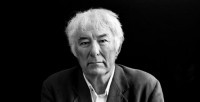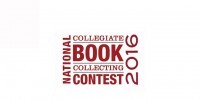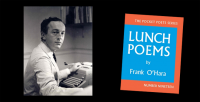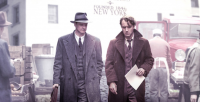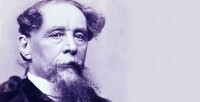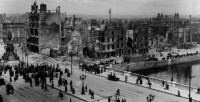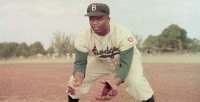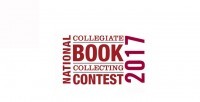Today is the third anniversary of the sudden death of Nobel-Laureate Seamus Heaney. A ground-breaking poet, his career sought to find parallels and common ground across many different traditions. Born of a Catholic family in majority-Protestant Northern Ireland, he rejected the violence of the 1970s, yet strongly claimed his Irish heritage and identify, politely refusing to be included in anthologies of British poets and declining the post of Britain's Poet-Laureate. His earliest poems, are described as naturalistic and explore his rural upbringing, celebrating the small comforts and familiarities of farming communities and considering his family heritage of agriculture on one side and industrialization on the other. As a fellow Irishman, his poetry was the first in which I found personal resonances, similarities to my own family stories, scenes that I could recognize from my own life, despite differences in age and geography. Over the years, I've become a huge fan and frequent reader of Heaney. Eleven Poems — His First Pamphlet (November 1965) Belfast: Festival Publications, 1965. First edition, first issue, with a nine-pointed purple sun illustration to the front cover, printed on laid watermarked paper. Original publisher's wrappers. An excellent copy, with a short closed tear to the spine head, light creasing to the front wrapper, some minor soiling to the wrappers, light pencil marking to the first poem, otherwise bright and clean pages. Overall, a near fine copy of an... [more Remembering Seamus Heaney]
On Collecting Books
I'm thrilled to announce the winners of this year's National Collegiate Book Collecting Contest: 1st Place: Luke Kelly. Harvard Unversity. “A Collection of Eugene Walter, King of the Monkeys” 2nd Place: Megan Jones. University of Kansas. "The Life and Times of Sacco and Vanzetti" 3rd Place: Micaela Beigel. Goucher College. “Once We Were Dreamers: A Collection of Jewish Resistance During the Holocaust” Essay award: Samantha Flitter. Princeton University. “The Sand and the Sea: An Age of Sail Library in Rural New Mexico” The judges were impressed with the stories and thought that went into assembling these collections and wish to thank all who participated. The Awards Ceremony will take place at the Library of Congress on October 14th at 5:30pm. Our featured speaker is Toni Tipton-Martin. The event is free and open to public. Thanks to all who entered. [more 2016 National Collegiate Book Collecting Contest Winners Announced]
Editor's note: Geoffrey Hill (1932-2016) was considered by many to be the finest poet writing in English of his time. His first poetry appeared in the early 1950s and his last book was published in 2012. His work is dense, lyrical, layered, scholarly, arcane, and sometimes not easily accessible, which makes the rewards of his poetry all the greater for those who take up its challenges. We asked Graham Shearing, an Englishman who has collected and read Hill for many years, to discuss his poetry, and Jett Whitehead, a specialist in modern poetry, to discuss editions of Hill's works. GRAHAM SHEARING: Around 1980 I was in a bookshop in Bath, England, when I first found Geoffrey Hill's Tenebrae, then two years since its publication. I was struck by the design of the wrapper and the magical word Tenebrae, with its liturgical associations. I bought one other book, of somewhat lubricious poetry, that day, by a now-forgotten poet (as is so often the case). But I devoured the Hill on the bus back to Downside Abbey, some miles away... the rattle of the bus drowned out in my mind by the force of his “Lacrimae, or, Seven tears figured in seven passionate Pavans” and its deliberate evocation of John Dowland's music. Tenebrae : Andre Deutsch, 1978. paper covered boards, dust jacket. 8vo. paper covered boards, dust jacket. 48 pages. First edition. Duff Cooper Memorial Prize winner 1979 wrap-around. Poetry Society leaflet loosely inserted. Fine. (Offered by Oak Knoll Books) I returned to ... [more Reading & Collecting Geoffrey Hill]
I first met the poet Frank O'Hara in the early 1990s. I was in the process of abandoning the writing program I was enrolled in at a local university for the much less muddied waters of the religious studies department; and, for his part, Frank had been dead for a little over twenty-five years. Frank O'Hara died at 8:50 p.m. on July 25, 1966 at Bayview General Hospital on Long Island. Mark Ford, editor of O'Hara's Selected Poems (2008) , succinctly describes the events of the previous evening, a night O'Hara spent with his friends Morris Golde, J. J. Mitchell, and Virgil Thomson clubbing on Fire Island. “The beach taxi in which he and his friend J. J. Mitchell were traveling broke down. As they waited for a replacement to arrive, a Jeep approaching from the opposite direction swerved to avoid the stranded taxi and travelers, and it struck O'Hara.” Frank and I met in a seedy bookshop on campus, a second floor walk-up promisingly dubbed Ice 9. In the airless front room of the shop were displays of toe-curlingly pornographic photo collections, dusty issues of Re/Search featuring Throbbing Gristle and Brion Gysin, and excitingly garish works by Kathy Acker, Jack Black (hobo author of You Can't Win fame), and J. G. Ballard. Perusing the makeshift shelves in the smaller rear room I came across a small display of poetry titles including a healthy dollop from the City Lights Pocket Poets Series. Ginsberg, Ferlinghetti, Kerouac, I ran my finger across the familiar spines. But ho! W... [more Frank O’Hara in 1966]
Maxwell Perkins was the most famous editor of the golden age of American letters, working with Ernest Hemingway, Thomas Wolfe, Marjorie Kinnan Rawlings, F. Scott Fitzgerald, and many others. Rather than attempt to compress his mammoth career into two hours, the new film Genius, starring Colin Firth and Jude Law, focuses on Perkins relationship with Thomas Wolfe, perhaps his most gifted author, but also his greatest challenge. ABAA members offer many interesting items connected to Maxwell Perkins and his stable of famous authors, from glamorous first editions and rare books, to unexpected ephemera like mundane letters between the editor and various literary executors. Carolina Folk Plays: Second Series. Edited with an Introduction on Making a Folk Theatre by Frederick H. Koch New York: Henry Holt and Company, 1924. First edition. Thomas Wolfe's first appearance in a book, following the separate publication of his "Crisis in Industry.". 8 photographic illustrations including one which shows Wolfe portraying Buck Gavin, two woodcuts by J.J. Lankes and another by Mary De B. Graves. xxxiv, 173, pp. 1 vols. 8vo. Original buckram, lettered in green. Fine in pictorial cream dust jacket, with small loss on top of front panel, with price change on front cover from $1.75 to $2.00. In blue cloth box and chemise. Contains Thomas Clayton Wolfe's first play. Written for his dramatic writing course, the "Carolina Playmakers" taught by Frederick H. Koch. When it was produced in March 15 and 1... [more Max Perkins: Genius Editor]
Charles Dickens was only 58 years old when he passed away. He had long pushed himself too hard for the love of his work and his followers, and in the summer of 1870 (June 9th, to be exact) he succumbed to exhaustion and after experiencing a fatal stroke, was laid to rest. His work, however, has gone on to be remembered since, and the author has never been out of print. His final work, The Mystery of Edwin Drood, has long fascinated fans, as the murder mystery was unfinished at his death and Dickens never (formally) named the murderer. On this the 145th anniversary of the author's death, we look at his last years and his final work – a novel that he persisted on writing, even while suspecting his end was near. Dickens' health began to decline when he was involved in the Staplehurst rail accident on June 9th 1865 (five years to the day before his death, coincidentally). On his return from Paris with his young mistress Ellen Ternan and her mother, the train they were traveling on plunged off a cast iron bridge that was under repair. Luckily, the only 1st class carriage to remain on the track was that one in which Dickens was traveling. Until more aid arrived to tend to the victims, Dickens scrambled around the horrific scene offering brandy and a hat with water, looking after the dead, dying and wounded around him. The tragic incident cast a shadow on Dickens' life – the horror and absolute panic he experienced led to sleepless nights and night terrors for the rest of his sh... [more Charles Dickens’ Final Chapter]
Job Posting: Historical Documents Dealer in Westport, CT Seeks Researcher with 3+ Years’ Experience
By Susan BennePrivate company in Westport, Connecticut seeks a researcher with exceptional organizational skills for small, friendly, fast-paced office that specializes in historical documents, books, and artifacts. Auction expertise a plus. Must be able to work quickly and accurately in cooperation with other staff members in a variety of roles. Excellent written and verbal communication skills a must. Responsibilities include research of new acquisitions for database and website, coordination of in-house auctions, representation at prestigious shows and exhibitions. Proficiency in computer databases, internet, and social media skills are necessary. Bachelor's degree plus three years' experience. Salary range: $40,000-$60,000 yearly. Please send resume to: Loraine@universityarchives.com. [more Job Posting: Historical Documents Dealer in Westport, CT Seeks Researcher with 3+ Years’ Experience]
The streets of Dublin witnessed the largest parade in Irish history this Easter, as hundreds of thousands gathered to mark the centenary of the 1916 Easter Rising. That revolt, by historical standards, was brief and seemingly futile in the short term. After the April 24 proclamation of an Irish Republic, perhaps fewer than 2,000 participants actually took up arms, and they were easily crushed within days by the British bombardment of much of central Dublin and the surrender and execution of its leaders. Nevertheless, the Rising boasts an outsize legacy not only in its ultimate political consequence of Irish independence five years later, but in its literary birthright, for a number of those involved in the uprising were authors of poetry and prose that had sculpted perceptions of Irish nationhood. Moreover, the destruction wrought upon Dublin and the execution of the rebel leadership inspired others who had not been involved – even some who had looked upon the armed uprising in dismay – to grapple with its legacy in words that resound to this day. The struggle for Irish independence from the British Crown had surged and ebbed for many years, of course, one of the high points being the months of battles led by the United Irishmen in 1798, inspired by the successful revolutions in the American colonies and in France. By the 1910s, however, many had thought that the flame of discontent had shrunken to a dull gleam. Although the House of Lords had failed to pass a Home Rule B... [more 1916: Collecting Ireland’s Easter Rising]
Hailed as "the sports equivalent of the Emancipation Proclamation," one of the original contracts Jackie Robinson signed with the Brooklyn Dodgers has been authenticated by ABAA member John Reznikoff (University Archives) and appraised at $36 million by ABAA member Seth Kaller (Seth Kaller, Inc.). Owned by businessman Mykalai Kontilai, the contracts will go on display at the Collectors Café in New York City next week. ESPN reported on the contact this week, quoting Reznikoff: "It passed all the tests with flying colors, everything that I looked at," Reznikoff said this week. "There's a lot of components to a document. There's ink, paper, printing, and everything was consistent." "I'm 110 percent sure" it's real, Reznikoff said. and Kaller: "Their effect on American history, and even the world, transcends the bounds of sports," Kaller wrote in his appraisal. "Jackie Robinson's contracts are documents of freedom in the same vein as the Declaration of Independence, the Constitution and the Emancipation Proclamation." You can read the ESPN story in its entirety here... Some items signed by Jackie Robinson from abaa.org: Fine signed and inscribed 3.5" X 5.5" postcard portrait by Jackie Robinson in the dugout. He signed in blue ball point pen, "To...with best wishes, Jackie Robinson." The last two letters are light. His printed signature shows below the portrait. (Offered by Schulson Autographs) WAIT TILL NEXT YEAR. THE LIFE STORY OF JACKIE ROBINSON (Signed, First Edition) New Yor... [more Jackie Robinson’s Original Contracts Authenticated]
The ABAA, in partnership with The Library of Congress, the Fellowship of American Bibliophilic Societies, and the Grolier Club, is currently accepting entries for the 2017 National Collegiate Book Collecting Contest. The contest aims to encourage young collectors to become accomplished bibliophiles. We are honored to once again have support from the Jay I. Kislak Foundation, the generous underwriter of prizes for this contest. Collegiate Book Collecting Contest winners, and interested students whose institutions do not offer contests, can submit entries at apply.abaa.org. All entries for the 2017 competition must be submitted by May 31, 2017. For more information on the contest, please visit contest.abaa.org. If you have any further questions, please contact hq@abaa.org. Need some inspiration or ideas? Meet Previous National Collegiate Book Collecting Contest Winners Last year's winners built fascinating collections on topics as diverse as formalist Russian composers, women in the Spanish Civil War, and 20th Century Southern Literature. We asked the four winners to tell us more about their collections... [more 2017 National Collegiate Book Collecting Contest]


